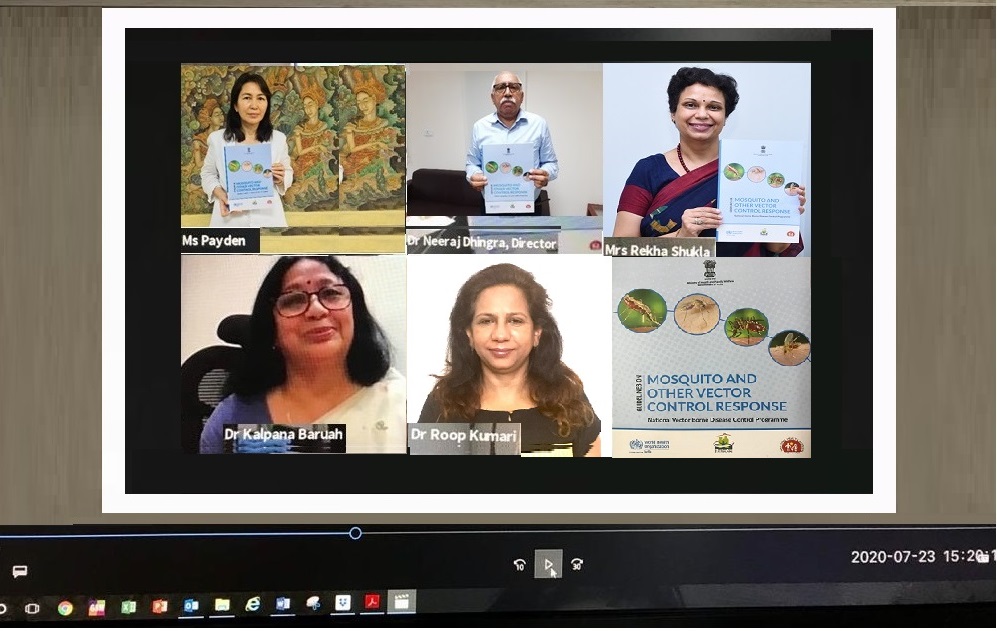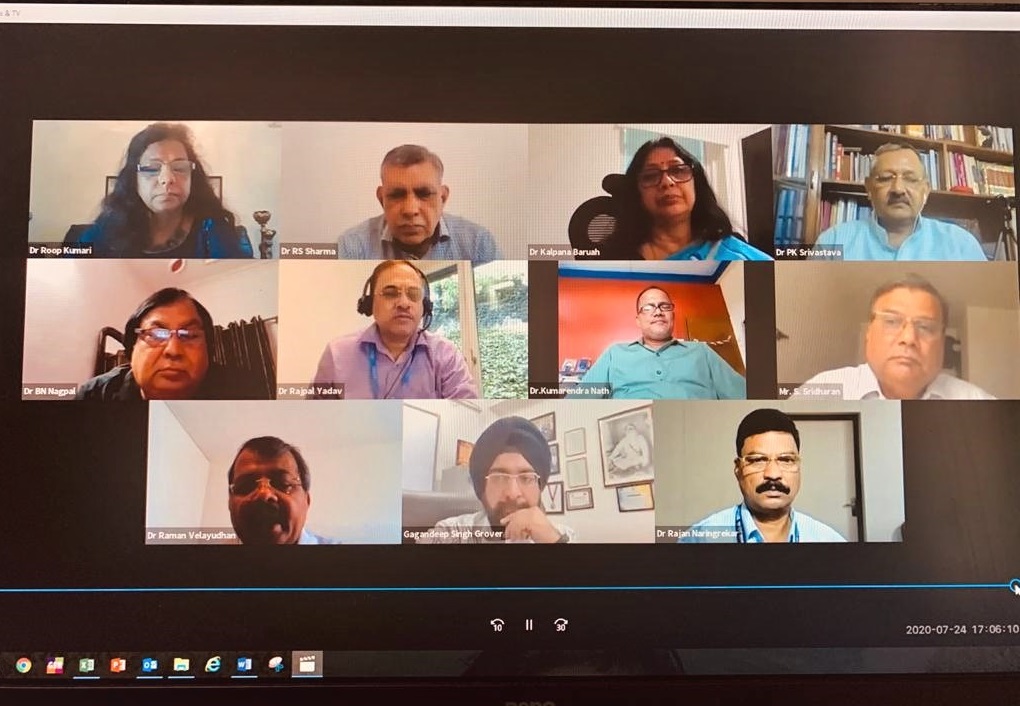As part of the launch of the guidelines on Mosquito and Other Vector Guidelines on Control Response (MVCR), the National Vector Borne Disease Control Programme (NVBDCP) and the World Health Organization (WHO) Country Office for India jointly organized a webinar on Integrated Vector Control Management in sync with Global Vector Control Response. The two-day webinar brought together the state program officers, vector-borne disease (VBD) consultants, entomologists, district VBD officers and WHO officials to a stimulating discussion on various aspects vector borne disease elimination and control. The webinar drew close to 1000 participants from 36 states and union territories and provided a platform for cross-learning and sharing of strategies.
Ms Rekha Shukla, Joint Secretary (Vector Borne Diseases), Ministry of Health and Family Welfare, Government of India; Dr Neeraj Dhingra, Director, NVBDCP; and Ms Payden, Deputy WHO Representative to India, released the Guidelines on Mosquito and Vector Control Response (MVCR) during the webinar. MVCR has been developed by NVBDCP in collaboration with WHO Country Office for India, aligned with the WHO Global Vector Control Response (2017–2030).
While addressing the participants, Ms Rekha Shukla, Joint Secretary (VBD), MoHFW, Government of India said, “Effective vector control management requires collaborative efforts of all the partners. Therefore, intersectoral convergence is important at all levels. The convergence of diseases under the National Health Mission has helped in mobilizing financial resources to implement VBD interventions in the states. Efforts are being undertaken to strengthen the prevention and control of vector borne diseases. The states must effectively plan and implement new strategies, knowledge and guidelines to eliminate VBDs.”
Dr Neeraj Dhingra, Director NVBDCP said, “VBDs such as Malaria, Kala-azar and Lymphatic Filariasis are in the elimination phase. There is drastic decline of malaria cases in the country and it is important that the gains accrued in the past are not lost, therefore, entomological assessment in different settings of disease elimination is very important. The pandemic has brought many challenges, but we must deal with it and continue with the VBD interventions”.
Acknowledging the importance of innovative approaches towards the elimination and control of vector-borne disease, Ms Payden, Deputy WHO Representative to India stated, “Innovative approaches will enable the country to fast-track progress towards elimination and control of VBDs. It is equally important to map vector resistance data to guide policy decision. The need is to work together and set up a coordination mechanism between all the key stakeholders. WHO is fully committed to continue supporting NVBDCP in accelerating initiatives including strengthening entomological capacity to achieve the goal of key VBD elimination.”
 Experts and state officers presented implementation and operational strategies of malaria vector control in different settings; operational monitoring of the durability of long-lasting insecticidal nets (LLINs); implementation of bye-laws in vector control in their respective states and effectiveness of the interventions implemented in the states. The WHO experts provided an update on implementation of GVCR and WHO guidance on vector-borne diseases particularly during COVID-19. The entomological infrastructure for rolling out MVCR guidelines was also presented.
Experts and state officers presented implementation and operational strategies of malaria vector control in different settings; operational monitoring of the durability of long-lasting insecticidal nets (LLINs); implementation of bye-laws in vector control in their respective states and effectiveness of the interventions implemented in the states. The WHO experts provided an update on implementation of GVCR and WHO guidance on vector-borne diseases particularly during COVID-19. The entomological infrastructure for rolling out MVCR guidelines was also presented.
The discussions during the webinar outlined challenges and opportunities in vector control measures; and provided strategic guidance and recommendations for strengthening entomological surveillance and vector control as a fundamental approach to prevent disease and respond to outbreaks.
Other key experts who facilitated the technical sessions on vector control and entomological monitoring strategies were Dr Raman Velayudhan, Unit Head, Veterinary Public Health, Vector Control & Environment Unit, WHO HQ; Dr RS Yadav, WHO HQ, Dr Kalpana Baruah, NVBDCP; Dr Roop Kumari, National Professional Officer, Malaria and vector-borne diseases, Dr B.N. Nagpal, SEARO and senior entomologists - Dr PK Srivastava and Dr R.S. Sharma. The expert panelists recommended that to carry out insecticide resistance monitoring and management, all entomological zones should be made functional and the health workforce should be appointed in the project states. They also proposed constitution of steering committees at the district levels to encourage inter-sectoral collaboration.
Presentations
Global vector control response and its implementationInsecticide resistance monitoring and management in India
Malaria vector control in different settings
Significance of Vector Biology in Vector Control Program
